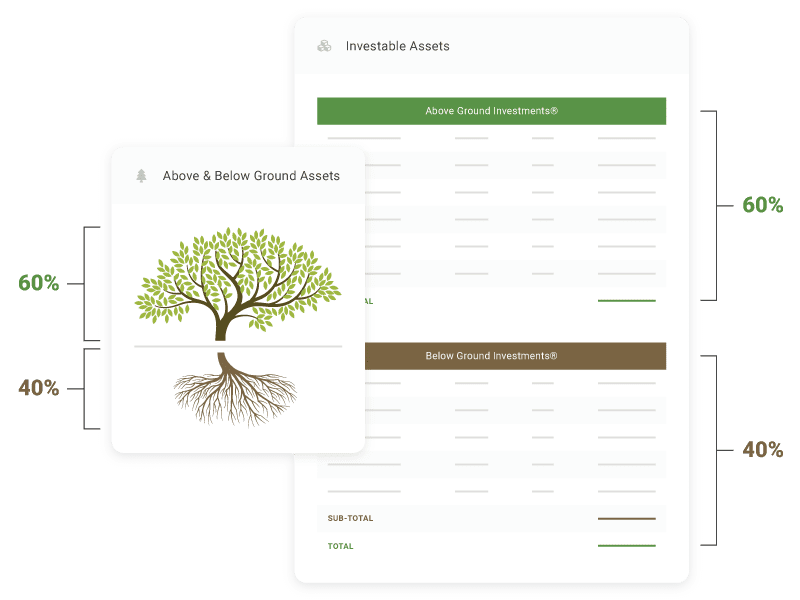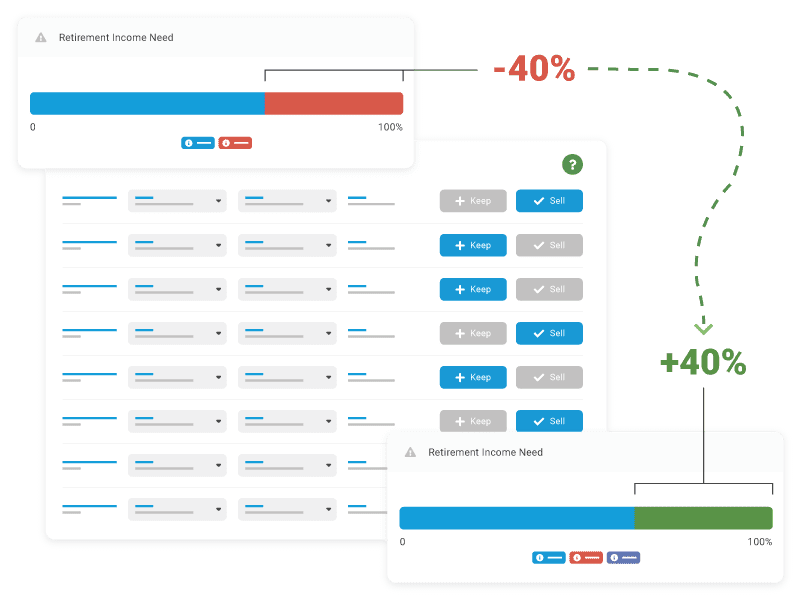Understanding what method works best for you and the benefits of using a financial advisor

which is better saving or investing – Kaizen Wealth
When it comes to financial planning, there are a lot of different strategies that people use to try and secure their future. Some people choose to save their money while others choose to invest it. Similarly, some folks may elect to do their investing homework, while others rely on the expertise of a financial advisor. But what strategy works best? Below we will explore the basics of each approach so you can make the best decision for your financial future.
Saving vs. Investing: Which is Better?
Thinking About Saving Money?
Saving money is a relatively low-risk way to grow your finances. When you put money into a savings or money market account, it is safely guarded by the financial institution and there is very little chance you will lose any of it. Your bank account, in fact, is insured by the FDIC (federal deposit insurance corporation) for up to $250,000. This means your money is guaranteed by the government. When you have a guarantee and know your money is safe, it can be a relief for your long-term financial plans. This makes saving money a great option for people who are risk averse.
Access to liquidity is yet another reason to save money. This means your savings can act as an emergency fund you can access at any time and use for whatever you need. This can be helpful in a number of different situations. For example, if you lose your job or have unexpected costs your savings can help to alleviate the financial pressure you might feel. With investing, on the other hand, you may have to pay fees or penalties if you want to withdraw your money early.

Are you considering investing – Kaizen Wealth Management
Considering Investing Money?
As we all know, investing involves risk, yet there is also the potential to earn a higher return than if you simply put your money into savings. For example, if you invest in stocks or mutual funds, over time, the stock market has averaged about a 10% return. This means if you invest $1,000 today, it could be worth $10,000 in 25 years.
The returns on your investment can be further enhanced with compound interest, which is one of the biggest advantages of investing your money. Compound interest is when you earn interest on your original investment, as well as the interest that has accumulated over time. This can help your money grow at a faster rate than if you simply saved it.
For example, let’s say you invest $10,000 at a 5% interest rate. After one year, you will have earned $500 in interest. However, in the second year, you will earn interest on the original $10,000 as well as the $500 in interest from the first year. This means that you will earn $1050 in total interest after two years. As you can see, compound interest can help your money grow significantly over time.
In addition to the potential for growth, another benefit of investing is that it can help offset inflation. Over time, prices for goods and services tend to go up due to inflation. This decreases the purchasing power of your money. However, if you invest wisely, your investments should increase in value at about the same rate as inflation so that your purchasing power stays the same.
Yet another benefit of investing is diversification. This means that you diversify your investment portfolio into different financial products or investment accounts so that you do not have all of your eggs in one basket. For example, if you invest in stocks, you could also invest in bonds or real estate. This way, if one investment goes down in value, the others may still be doing well. This is especially helpful for those with low risk tolerance, as it can help minimize your risk and maximize your returns over time.
Investing can also provide you with passive income. This is money that you earn without having to work for it. For example, if you invest in stocks or real estate, you may earn dividends or rent payments each month. This can provide you with additional income to cover expenses or save for retirement.

Prioritizing your financial goals – Kaizen Wealth
Prioritize Your Goals
Why is it important to prioritize your financial goals? No matter how you plan to reach your financial goals, you need to have a plan on how you will achieve them and how you will prioritize your goals. Are they long-term or short-term financial goals?
When it comes to savings goals, there are generally two different types: short-term and long-term. Short-term savings goals are those that you hope to achieve within the next few years, while long-term savings goals are typically those that you plan to save for over a longer period of time, such as 10 years or more. Retirement savings is a good example of a long-term savings goal.
Some common short-term savings goals include saving for a down payment on a house or car, saving for a vacation, or establishing an emergency fund. Establishing an emergency fund is often recommended as a first step in beginning to save, as it can help you cover unexpected expenses in the event that you lose your job or have a medical emergency. Once you have an emergency fund in place, you can begin working towards other short-term goals.
Long-term savings goals tend to be more specific, such as retirement savings or funding your child’s college education. When saving for retirement, it’s important to start early and to make regular contributions to your retirement account. The earlier you start saving, the less money you will need to save each month in order to reach your goal. For example, if you start saving for retirement at age 25 and plan to retire at age 65, you would need to save approximately $300 per month if your goal is to have $1 million saved by retirement. However, if you wait until age 35 to start saving, you would need to save approximately $550 per month in order to reach the same goal. As you can see, starting early can have a big impact on how much money you will need to save each month in order to reach your goal.
When it comes to financial goals, it’s important to start early and to be clear about what your goals are. Do you want to save for a down payment on a house? Want to retire at age 55? What about saving for a child’s college education so it can be paid for when they turn 18? Once you know what your goals are, you can begin taking steps toward achieving them. And remember, starting early is always best!
You can find a helpful investing vs. saving checklist here that may help you decide the best way to reach your goals, whatever they may be.
Investing > Saving
While it is recommended to have an emergency fund, there are several benefits to investing your money instead of saving it all up. With compound interest and diversification, you can grow your wealth significantly over time while minimizing your risk.
Additionally, investing can provide you with passive income to help cover expenses. If you are thinking about what to do with your money, consider investing in stocks, bonds or mutual funds it instead of leaving your money in a bank account. You may be surprised at how much your wealth can grow.
The Benefits of Using a Financial Advisor
Now that you’ve decided to invest your money, what method shall you choose? When it comes to investing, there are a lot of different options out there. For some people, the thought of picking stocks or managing a portfolio on their own is daunting. Others might feel like they are fully capable of handling their own finances and don’t want to pay someone else to do it for them. So, what’s the right choice?
While there are some benefits to investing on your own, there are also several compelling reasons to use the services of a financial advisor. Not only can they help you make smarter financial decisions, but having a financial expert on your side can help ensure your investment strategies and long-term investments are working in your best interest.
Experience and Expertise Matter
One of the most important reasons to use a financial advisor is they have the experience and expertise to help you make smart investment choices. They know how to find the right mix of investments for your unique circumstances and goals and can help you avoid common mistakes.
They can guide you toward specific investments that benefit your overall financial well-being. When a good financial advisor takes a moment to understand your financial priorities they can provide advice on key takeaways about things like your retirement accounts and investments in your potfolio. Alternatively, they can help to educate you to better understand the investment vehicles available to you so you can make the best financia decisions for yourself and your family.
If you’re looking to understand how to pick the right financial advisor for you, take a moment to read our guide on, How to Pick the Right Financial Advisor.
Helping You Stay Disciplined
It’s natural to feel elated when your investments are doing well and to feel discouraged when they aren’t. Investing can be emotional, and it can be difficult to stick to your plan when the stock market takes a dip. A good financial advisor will help you stay disciplined during down markets and keep you from making rash decisions that could jeopardize your long-term financial security.

Choose a financial advisor who prioritizes your goals – Kaizen Wealth
A Personalized Approach
Choosing the right professional is an important step. Having one that puts you first and will get to know you and your unique circumstances before making any recommendations can make an important difference. Not only do they take the time to know you unlike most financial advisors, they can work with you to ensure you have enough money for your future goals. They can do this by taking into account things like risk tolerance, time horizon, and investment goals before putting together a personalized plan for you.
Providing Peace of Mind
Making investment decisions can be stressful, especially if you don’t have a lot of experience in this area. Having an investment adviser who is knowledgeable and looking out for your best interests can give you peace of mind and help reduce stress levels.
Access to More Resources
When you work with a financial advisor, you are tapping into a wealth of resources you wouldn’t have access to if you were going at it alone. Financial advisors have access to research, investment and insurance products, and resources that can help you make the best choices for your money. They also have the ability to assist with tax planning and offer relationships with other professionals, such as accountants and attorneys, who can provide additional guidance and advice when needed.
Here at Kaizen Wealth we use tools like Simplicitree to help guide our clients every step of the way. Be sure to ask the financial advisor you work with (or are considering working with) what tools they will use to help benefit you.
Acting in Your Best Interest
When you work with a financial professional you have the assurance that they’re held to a standard. Financial advisors are held to a fiduciary standard, which means that they are required by law to act in your best interests. When you work with an advisor, you can rest assured they are looking out for your best interests and working to help you reach your financial goals.

Get ready to take the next steps toward your goal – Kaizen Wealth
Get Ready to Take the Next Steps
There are a lot of different factors to consider when making the decision of saving vs. investing, and whether or not to use the services of a financial advisor. Ultimately, personal finance comes down to what makes sense for you and your financial situation.
While there are some benefits to saving or investing on your own, there are also several compelling reasons to invest your money and use the services of a financial advisor. Financial advisors have the experience and expertise to help you make smart investment choices, can help you stay disciplined when markets are down, take a personalized approach to your financial plan, and provide peace of mind with sound investment advice.
All this said, not all financial advisors are created equal. If you’re not sure about your financial situation, where to start, or don’t feel confident in your ability to manage your investments, working with Kaizen Wealth Management may be the best option for you. Contact us today to learn how we can help.



